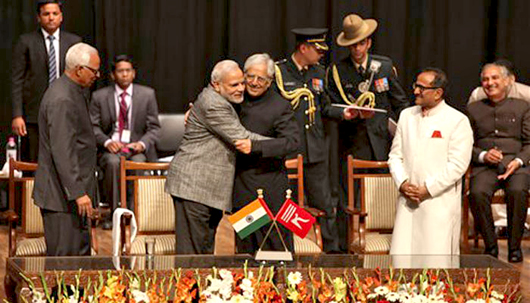Jammu, Mar 2: PDP chief Mufti Mohammad Sayeed called for peace Sunday after taking oath as chief minister of Jammu and Kashmir, heading a coalition that brought the BJP to power for the first time in India's only Muslim-majority state.

Prime Minister Narendra Modi and BJP leaders Amit Shah and L.K. Advani were among the 1,400 guests who witnessed the ceremony, over two months after the PDP and the BJP won 28 and 25 seats respectively in a hung verdict that exposed deep divisions between the Muslim and Hindu areas.
After taking oath in English, Sayeed, 79, warmly hugged Modi and sat close to him on a flower-decked stage at the Jammu University's General Zorawar Singh auditorium to witness the entire ceremony.
Later, addressing the media, Sayeed said he had told Modi that peace was a must if Jammu and Kashmir had to prosper.
He said the Modi government must address the need for a dialogue between India and Pakistan, two countries which dispute the ownership of Jammu and Kashmir. Kashmiris, he said, must be involved in the process.
In an indication as to what he desired, Sayeed lavished praise on former prime minister and now ailing BJP leader Atal Bihari Vajpayee for starting a peace process with Pakistan in 2003 - when Sayeed was chief minister the first time.
And in comments that would not have pleased many BJP supporters, he credited Pakistan, the separatist Hurriyat group and militants for what he said was a peaceful ballot in November-December last year.
"The PDP-BJP government is a historic opportunity to fulfil the aspirations of the people of Jammu and Kashmir and take the state to new heights of progress," Modi tweeted.
The National Conference and the Congress stayed away from the oath-taking ceremony.
National Conference leader Omar Abdullah took a dig at BJP ministers for taking oath to uphold the Jammu and Kashmir constitution - the only Indian state to have its own constitution and a flag.
Son of a religious preacher from the Kashmir Valley, Sayeed will head the government of his Peoples Democratic Party and the Bharatiya Janata Party, and will be the chief minister for all of six years.
BJP leader Nirmal Singh will be the deputy chief minister. He said the two parties would provide a stable government.
Former separatist leader Sajjad Gani Lone took oath as a BJP ally, and then warmly hugged Modi and Sayeed, triggering thunderous applause.
Inclusive of Sayeed, the PDP will have 11 cabinet berths and the BJP six, Lone included. The PDP and BJP have three and five junior ministers respectively. Two of the junior ministers are women: Priya Sethi (BJP) and Asiya Naqash (PDP).
The PDP cabinet ministers are Abdul Rehman Bhat Veeri, Javaid Mustafa Mir, Abdul Haq Khan, Syed Basharat Bukhari, Chowdhary Zulfiqar Ali, Haseeb Drabu, Ghulam Nabi Lone Hanjura, Altaf Bukhari, Imran Raza Ansari and Naeem Akhtar.
The BJP's cabinet members are Nirmal Singh, Chander Prakash, Choudhary Lal Singh, Bali Baghat, Sukhnandan Kumar and Lone (Peoples Conference).
The junior ministers are Chering Dorjay, Sunil Kumar Sharma, Abdul Ghani Kohli, Priya Sethi and Pawan Gupta (all BJP) and Abdul Majeed Paddar, Muhammad Ashraf Mir and Asiya Naqash (all PDP).
In the evening, the PDP and the BJP released a common minimum programme (CMP), promising to transform Jammu and Kashmir as "the most ethical state ... from the present day position of being the most corrupt state".
The CMP promised "genuine autonomy of institutions of probity", and "a sustained and meaningful dialogue" for peace with "all internal stakeholders ... irrespective of ideological views and predilections".
It revealed the continuing difference of opinion between the two parties on the controversial Armed Forces Special Powers Act, which gives sweeping powers to armed forces in the state. The PDP wants it to go.
This is the second time Sayeed heads a coalition government in Kashmir. He took power in 2002, heading a PDP-Congress alliance, for three years.
The Kashmir verdict brought about a clear divide between the Muslim-majority Kashmir Valley and the Hindu-dominated Jammu region, with the PDP winning almost all its seats in the valley and the BJP sweeping Jammu.
This is the first time the BJP is tasting power in Jammu and Kashmir, where a separatist campaign which has raged since 1989 has left thousands dead.





Comments
Add new comment